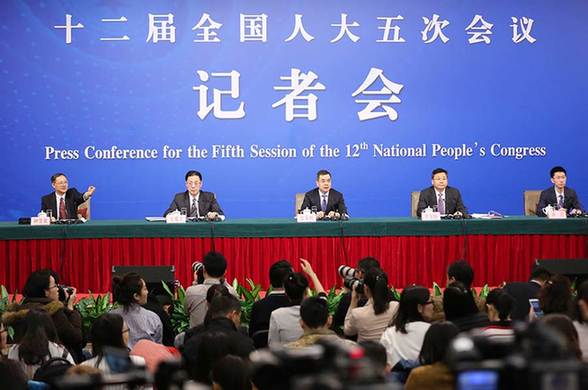 时刻新闻
时刻新闻

A news conference on draft general provisions of civil law is held in Beijing, March 9, 2017. [Kuang Linhua/China Daily]
On Wednesday, March 15, 2017, the 5th Session of the 12th National People Congress (NPC) is scheduled to formally adopt the General Provisions of Civil Law.
The General Provisions of Civil Law constitute the general part of the People’s Republic of China’s first-ever comprehensive Civil Code, which is due for roll-out in 2020 after literally decades of preparatory work and rigorous debates.
The General Provisions consist of 210 articles and 11 chapters and are based on the landmark 1986 General Principles of Civil Law (GPCL), which were partly revised in 2009.
The finalized Civil Code, when promulgated in 2020, will include additional specific chapters on contracts, property rights, torts liability, marriage, succession, and foreign-related civil relationships, among others.
All of these specific, albeit quite lengthy, chapters already exist as free-standing Chinese laws which will be incorporated in the comprehensive PRC Civil Code.
The General Provisions provide the overall framework for China’s Civil Code which fundamentally defines and protects the civil and commercial rights of Chinese individuals, business entities, and other institutions in Chinese society. The General Provisions, as the core chapter of the Civil Code, also delineate legal relations between Chinese citizens and social and economic organizations, on the one hand, and Chinese government and administrative authorities, on the other.
As such, the NPC adoption of the General Provisions is a historic event of the highest magnitude for China’s legal system development and the rule of law in China.
The adoption of the General Provisions also marks a watershed for China in its quest to be recognized globally as a great power. China cannot become a truly great power without a world-class legal system. This is, without doubt, a major step in that direction.
The General Provisions are noteworthy in that they break new ground on various subjects updating and revising the earlier GPCL in light of the myriad social and economic changes that have impacted China in the ensuing decades. The General Provisions provide new definitions of legal persons: particularly, for-profit and non-profit legal persons. The non-legal person organization, including partnerships and sole proprietorships, is also a new wrinkle not found in the earlier GPCL.
The ideological baggage associated with so-called “enterprise legal persons” in the prior GPCL has been refreshingly jettisoned - a promising endorsement of market-based economic reforms. Rescuer protection has been added to the Torts chapter of the General Provisions to encourage greater civil responsibility amongst Chinese citizens in their response to emergency situations.
Under the General Provisions, Chinese individuals will enjoy new privacy and data protection rights as regards their online activities.
Moreover, on account of the explosion in Chinese internet usage and e-commerce, the General Provisions now recognize “virtual property” rights.
In line with China’s abiding commitment to sustainable development and the green economy, this new civil legislation also, importantly, contains provisions on ecological conservation, as well as, obligations which civil subjects undertake to protect the environment.
Although China is described as a civil law country, in the tradition of the continental European countries (especially France and Germany), many of its laws and legal concepts display an assortment of socialist law and common law elements with distinctive Chinese characteristics. For example, the PRC Contract Law is a composite of civil and common law rules and principles, derived in significant part from UN CISG.
The PRC Company Law and related enactments, based to a large extent on the German codes, nonetheless reflect significant United States and United Kingdom common law influence in the form of derivative actions and independent directors. Such an amalgamation presents issues as regards the overall doctrinal coherence of the forthcoming PRC Civil Code.
The adoption of the General Provisions ranks amongst the most important developments in the PRC’s legal history and given its laudably modern and humanistic orientation, represents a manifest commitment to further deepen market reforms and establish the rule of law in China.
This is particularly the case when one adds to the mix the panoply of state-owned enterprise (SOE), especially Central SOE, reform measures just announced by Premier Li Keqiang in this year’s Government Work Report. Such dynamic market-oriented actions should give pause to even the most hawkish conservatives in the US government.
They also serve as very palpable grist in China’s favor as regards the current dispute before the World Trade Organisation concerning whether China deserves to be accorded Market Economy Status (MES) like the rest of the WTO Membership - something the US, European Union, and Japan, at present, curiously oppose. They may now wish to reconsider their positions.
The author is an adjunct professor at the University of San Francisco School of Management.



